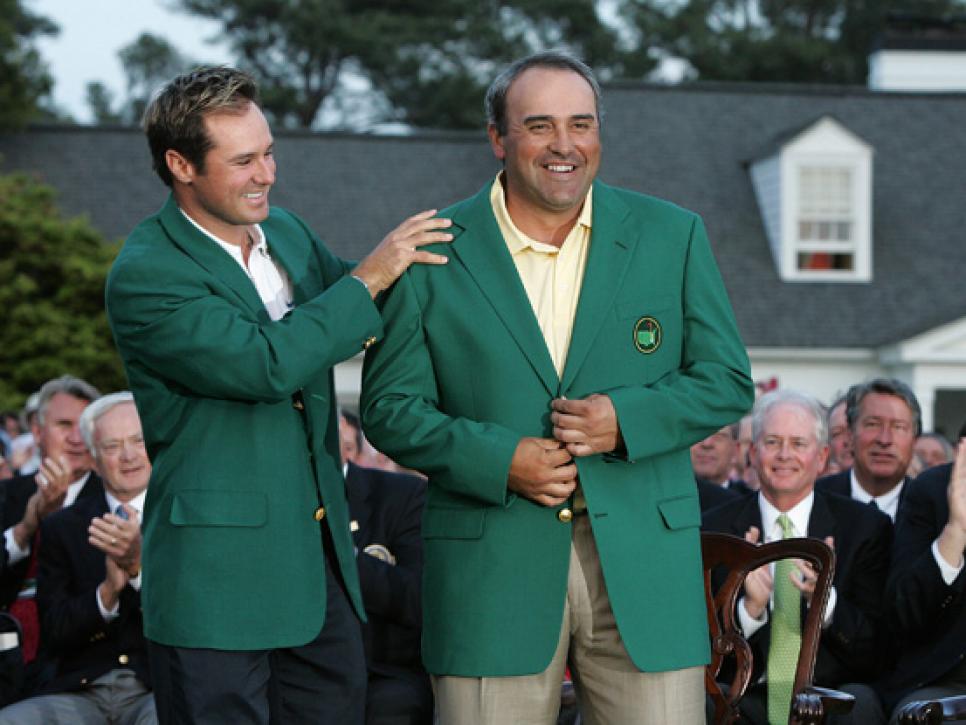News
What Predictions Say About Us

Angel Cabrera was a 125-1 longshot before winning the 2009 Masters.
A lot of energy is expended predicting the winner in golf -- in magazines, on television, in bars and locker rooms, and from everywhere online. We've done a bunch of it ourselves in this issue of Golf World.
The question is, "Why?"
No one, it seems -- at least since Tiger Woods was grabbing victories in bunches -- is ever right. Choosing the winner in golf is not like picking point spreads in football or basketball, where a typical professional gambler wins about 55 percent of the time.
In other sports, outcomes are far more predictable. In thoroughbred racing the favored horse wins about a third of the time. In major league baseball games the favored team wins nearly 60 percent of the time. In men's tennis Roger Federer, Rafael Nadal and Novak Djokovic each win slightly more than 80 percent of their matches.
Golf, by contrast, is a lottery. The highest winning percentage in PGA Tour history is Woods' 25 percent, but you can build a Hall of Fame career by winning 5.5 percent like Ernie Els. The fact is that having 155 opponents at one time isn't conducive to real domination, no matter how often that term is thrown around.
Is it any surprise that, as far as anyone knows, there has never been a Jimmy the Greek of golf? In his book The Signal and the Noise: Why So Many Predictions Fail, prognosticator extraordinaire Nate Silver does an extensive exploration of probabilities in baseball and sports betting in general. Nowhere in the 534 pages does the word "golf" appear.
To speak for the sport in this context, we found Steve Masek, a 26-year-old former greenkeeper who for the last seven years has run a golf handicapping service out of his home in London, Ontario. Masek says he has been profitable by charging a few hundred clients $19 a month each to receive his six best-bets to win the biggest pro tournament of the week. A seven-handicapper who plays about 100 rounds a year and studies the game obsessively, Masek says most of his clients are avid sports bettors who admit they know little about golf, but are drawn to the possibility of a big score that brings long odds -- such as Angel Cabrera at 125-1 before the 2009 Masters, which Masek says he recommended -- can bring. Last year, his 258 picks made over 43 weeks produced exactly 10 winners, the biggest longshot being Keegan Bradley before the WGC-Bridgestone Invitational at 60-1.
"I advise my clients to be patient," says Masek, "because the favorite in golf is rarely the best bet." Last year, for the record, in 46 events on the PGA Tour, the betting favorite or co-favorite won seven times -- Rory McIlroy three times, Woods twice, Luke Donald and Ryan Moore once each.
When money isn't involved, what's nice and safe about predicting golf winners is that there is no shame in being wrong. A sentence from baseball statistical maven Bill James' blurb on the back cover of Silver's book -- "We tend not to take predictions seriously because, on some level, we know that we don't know" -- would seem to apply to golf more than just about anything.
And so, why?
Well, predictions are a way of demonstrating knowledge. Of course, in most things, a successful demonstration involves being right. In golf, a good argument will suffice (thus, the Predictions Issue).
Most compellingly, human beings are wired to predict. In ancient times predictions served as psychological counterweight to the extreme uncertainty of life. As we've gained more control over daily existence, predictions help encourage the illusion that we are in charge of our own destiny. The more that is unknown, the greater the urge to predict. As the recently departed futurist author Ray Bradbury once said, "Mysteries abound where most we seek for answers."
Where are there more mysteries and unanswered questions than in golf? By predicting who will win a tournament, we golfers are fighting back at the game that confounds us and robs us of control. For a prideful moment, we can pretend to know. Predicting is not that different than finding temporary solace in the latest swing theory or newest equipment.
But in truth, golfers only dabble in prediction. We like golf better unknowable. It keeps us in it. Forecasting, almost always unsuccessfully, just brings us closer to golf's vastness and charm. Somehow, being wrong so often tells us we are playing the best game of all.